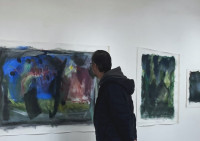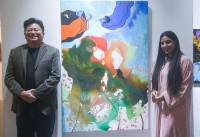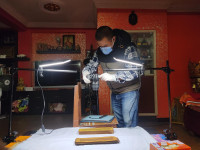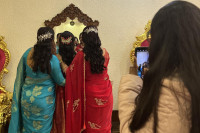Culture & Lifestyle
Tackling trauma and breaking barriers
Defying social norms, Parina Subba Limbu’s career as an activist has been a journey from traumatic experiences to empowerment.
Aarati Ray
When one meets Parina Subba Limbu, they will probably immediately think of words like confident and powerful because of her strong walk, bold manner, and self-assured voice. Yet, as Limbu recounts her past experiences, saying, “Looking back, I’ve learned, I have failed, been rude, angry, foolish, and very naive,” it’s difficult to reconcile these words with the poised woman.
Limbu is the founder and current chairperson of the first women-centred drug user organisation in Nepal, Dristi Nepal (Rights to Existence). The organisation won the Red Ribbon Award at the 20th International AIDS Conference in Melbourne, Australia, in 2014 and Limbu received the Special Jury Award at the Kamla Bhasin Award (constituted by Azad Foundation) for her efforts in promoting gender equality in 2023.
However, her journey towards establishing this organisation was paved with personal hardships. Raised in a middle-class indigenous family in Kathmandu, Dharan-born Limbu’s life took a harrowing turn at 16 when she endured abuse from a man with whom she lived. This traumatic experience led her down the path of drug use.
Navigating through drug dependency, violence, emotional turmoil, and sexual abuse, Limbu reached a point where she felt invisible, especially to herself. She lamented, “I reached a point where I felt like nobody, not even to others, because they never saw me, but mostly I felt like nobody to myself. I lost who I was.”
In 2006, Limbu met Lee Fitzgerald from the US who asked her what she wanted to do with her life. Limbu looked around and felt a strong desire to do something for women like herself—to create a safe space where they could connect and be themselves. She didn’t know much about starting an organisation, but she knew she wanted to help women feel safe. So, with financial help from Fitzgerald, Limbu started Dristi Nepal.
Previously, Limbu had never contemplated such matters as she lacked the freedom to do so. Her journey was fraught with numerous hardships, encompassing sexual, physical, and verbal abuse. Upon returning home to her parents, she encountered further rejection.
They told her she had brought shame to the family and would be mocked by relatives and society. This made Limbu feel hopeless and lost. She didn’t know what to do or where to turn for help, and she felt like couldn’t even seek legal assistance.
At one point, she thought people close to her, including family members and relatives, could have supported and understood her better. However, in hindsight, she doesn’t want to blame them. She has realised that her parents’ lack of support was being influenced by societal norms and expectations towards women.
As the eldest child in her family, Limbu was always outspoken and willing to take risks. She says she has always been straightforward and genuine. Meeting those women marked a new beginning for Limbu. Initially, she simply wanted a safe space, but over time her vision became clearer.
“I’m still learning. I wouldn’t deem myself an authority, nor would I claim all the credit for my current position. Along the way, I met remarkable individuals, particularly women, who bolstered, educated, financed, motivated and guided me to become who I am today.”
Limbu’s journey has been tough because of drug abuse and past traumas. It took her a long time to separate her personal struggles from her professional path, and society’s perception of women being weak and overly emotional didn’t help. These beliefs, along with her past traumas, created many challenges for her.
Over time, Limbu learned about human rights, society, patriarchy and how money works, all through her work. However, she says understanding these concepts and actually working on them are two different things.
One major challenge was her trauma from domestic violence, which led her to depression and required medication and therapy. “During this time, I learned how difficult it is for women in Nepal and South Asia to simply survive when they have a history of drug abuse and violence.”
In our society, encountering drug abuse often elicits blame, hostility, and ridicule rather than support, especially for women, as Limbu experienced firsthand. Throughout her activism journey, she encountered barriers stemming from societal stigma towards women grappling with drug abuse, alongside policies lacking inclusivity and equity for women, compounded by limited funding and donor backing. “Through my activism, I’ve come to recognise the pervasive influence of patriarchy,” she says.
In 2008, Dristi Nepal launched the Needle and Series programme to mitigate harm among women who inject drugs, particularly to reduce the risk of HIV transmission. Needle and Series is part of Dristi Nepal’s harm reduction programme, which aims to prevent harm related to health among people who use drugs. The programme was active until 2021.
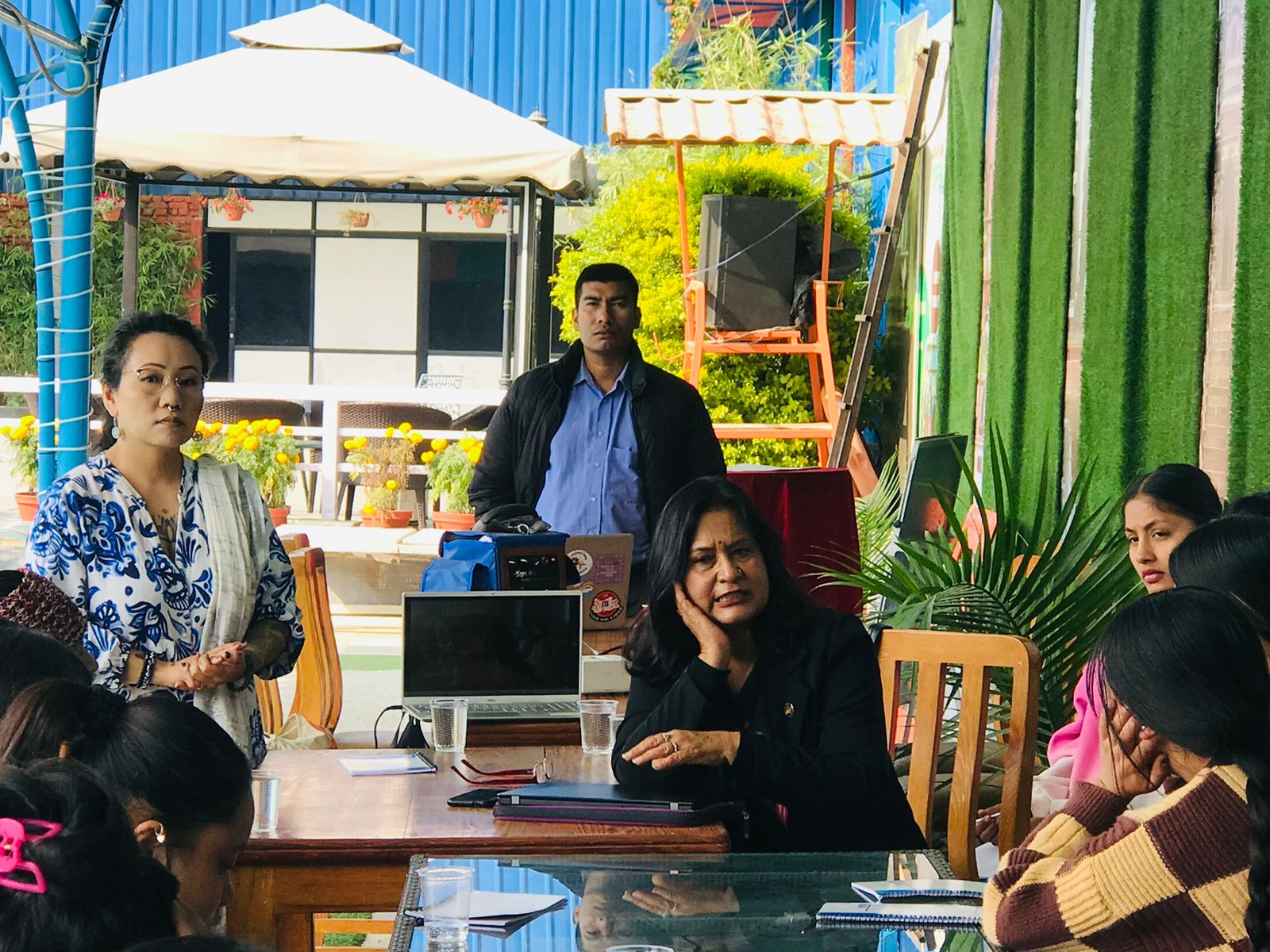
The onset of Covid caused some of Limbu’s plans for Dristi Nepal to be put on hold. Nevertheless, she currently directs her focus towards projects centred on human rights and empowerment through employment. These initiatives encompass advocating thrift culture and establishing information hubs to educate women on sexual and reproductive health and rights (SRHR) and employment prospects.
Limbu acknowledges that women face numerous challenges beyond drug abuse, such as violence, citizenship documentation issues, single motherhood, and lack of education. Without citizenship, they often lack income opportunities. “I’ve started to focus more on these interconnected issues beyond just HIV,” she shares.
While Dristi Nepal has implemented programmes for harm reduction and capacity-building, Limbu reveals that their efforts have predominantly centred on combating the HIV epidemic, overlooking other pressing issues.
Limbu points out that there is little data on women with addiction regarding gender violence, employment status, citizenship, and single mothers’ poverty levels. These groups of women have been overlooked. “I’ve realised it’s time to change our focus and address these neglected issues. Women battling drug abuse are also citizens and deserve rights.”
Limbu shares that women-led organisations face numerous hurdles, including often being overshadowed by men who take credit for their work and a lack of funding. She adds that women leaders are sometimes elected just for appearance and face discrimination within the organisation. Tokenism is common, with women expected to remain silent and not excel as much as their male counterparts.
Over time, she has also noticed that women in leadership roles are criticised way more harshly than men. This pressure, coupled with the inequities prevalent in grant allocation and project opportunities, prompted her to withdraw from social media and meetings sometimes.
“A big reason why my journey as an activist hasn’t been easy is because I refused to conform to social norms. However, I’ve come to realise that addressing women’s issues and fostering a supportive environment isn’t solely the responsibility of women. Men share equal accountability, as many challenges stem from patriarchy and gender disparities,” she says, adding that challenges are inevitable and she has learned to take a step back to reflect whenever she is in a tough spot.
Now, Limbu believes she has found a balance between her personal and professional life. She once felt guilty for not being there enough for her son. Her dedication to community work led her to continue working until the last day of her pregnancy and returning to the office just 22 days after giving birth. Later, she even attended conferences and workshops with her baby. “Back then, I lost myself in my work but I’ve gotten better now,” she says.
While she still loves community work, she now understands the necessity of self-care. “Without taking care of myself, I won't be able to effectively contribute to the community.”
Another important thing she has realised through is the crucial need for financial independence and economic empowerment for women. She actively strives to create environments offering job opportunities and safe havens for women to become self-reliant and work independently.
“The proudest moment of my life wasn’t receiving awards or accolades; it was when I found my voice, stood up for myself—made possible by earning my own income,” reflects Limbu.
Another issue she is dedicated to is raising awareness about gender violence and human rights, with a specific emphasis on SRHR and the legal assistance needed for it.
Reflecting on years of self-criticism for falling short of society’s ideals of being a commendable daughter, leader, or mother, she remarks, “We’re all inherently beautiful and resilient. Though we may not influence multitudes, we possess the ability to alter our own perspective, often our harshest critic. What truly counts is our self-perception, not societal mandates.”




 9.5°C Kathmandu
9.5°C Kathmandu
